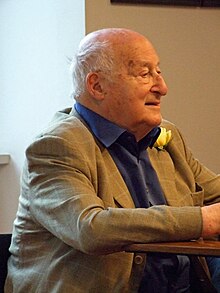Eric Koch
Eric Koch | |
|---|---|
 Eric Koch in Frankfurt am Main in 2009 | |
| Born | August 31, 1919 Frankfurt, Germany |
| Nationality | Canadian |
| Occupation(s) | Author, broadcaster, professor |
Eric Otto Koch (born 31 August 1919 in Frankfurt, Germany) is a Canadian author, broadcaster and professor.
Life
Koch was born in 1919 into a prominent assimilated German Jewish family. His grandfather was a court jeweller and his father, was an officer in the German Army during World War I.
In 1935, after the Nazis took power, he and his family fled to England as refugees. Koch continued his studies at Cranbrook School in Kent, England before enrolling at Cambridge University to study law.[1] In 1940, he and other Germans resident in Britain were detained as enemy aliens. Koch was deported to Canada where he remained interned until 1941 when he and most of his fellow internees were recognised by the government as "victims of Nazi aggression" and released. Koch continued his studies at the University of Toronto where he completed his law degree.[1]
In 1944, he was recruited to join the German Section of Canadian Broadcasting Corporation's new International Service broadcasting programmes from Montreal to Germany, initially as part of Canada's psychological warfare campaign during World War II and subsequently as part of efforts to educate Germans in democracy.[1] Koch remained with the CBC for 35 years serving from 1953 to 1967 as a member of the Department of Talks and Public Affairs in Toronto. He was promoted in 1967 to Area Head, Arts and Science and was responsible for the creation of a large number of radio and television programmes. From 1971 to 1977, he served as regional director in Montreal.[1]
He retired from the broadcaster in 1979 in order to focus on writing books and teaching at York University where he was a course director in the Social Science Division and taught a course on The Politics of Canadian Broadcasting for 18 years.[1][2] Koch is the author of 13 books of fiction, varying in genre from satire to historical fiction and five works of non-fiction.[2] Hilmar and Odette, the story of two of his half-Jewish relatives who remained in Germany during World War II and their contrasting fates, was awarded the Yad Vashem Prize for Holocaust Writing in 1996.[1]
His historical fiction has been set in the recent German past, particularly the period from the late 19th century and into the Weimar Republic, and has been published in Germany as well as Canada.
Works
Satirical fiction
- The French Kiss: A Tongue-In-Cheek Political Fantasy (1969)
- The Leisure Riots (1973)
- The Last Thing You'd Want to Know (1976)
- Goodnight, Little Spy (1979)
Historical fiction
- Icon In Love: A Novel Abouot Goethe (1999)
- The Man Who Knew Charlie Chaplin (2000)
- The Brothers Hambourg (2000)
- Earrings: Baden-Baden 1885 (2002)
- Premonitions: A novel (2008)
- Arabian nights! 1914: a novel about Kaiser Wilhelm II (2010)
- The Weimar Triangle (2010)
Science fiction
- Kassandrus (1988)
- C.R.U.P.P.: Two Science Fiction Novels (1990)
Non-fiction
- Success of a mission: Lord Durham in Canada (1961)
- Deemed Suspect: A Wartime Blunder (1985) (biographical)
- Inside Seven Days: The Show That Shook the Nation (1986)
- Hilmar and Odette: Two Stories from the Nazi Era (1995)
- I Remember the Location Exactly (2010) (family history)
- The Golden Years: Encounters with Glenn Gould, Marshall McLuhan, René Lévesque and John G. Diefenbaker (2013)
